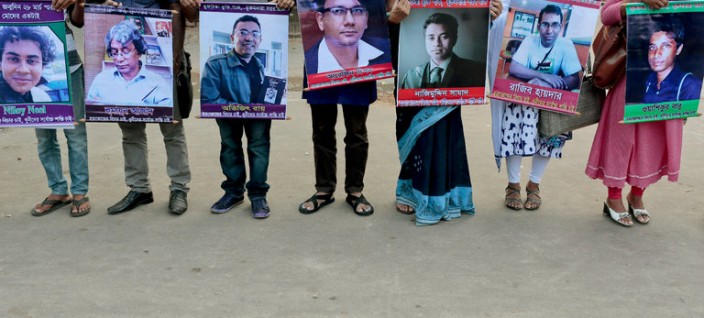Genocide Watch exists to predict, prevent, stop, and punish genocide and other forms of mass murder. Our purpose is to build an international movement to prevent and stop genocide.
Staff Login
Mass Arrests in Bangladesh Yield Scores of Militants, the Police Say
Mass Arrests in Bangladesh Yield Scores of Militants, the Police Say
Julfikar Ali Manik and Ellen Barry, The New York Times
21 June 2016
Image: Activists in Dhaka, Bangladesh, held portraits on Wednesday of people who were among those killed in recent years in attacks claimed by Islamist militants. CreditAssociated Press
DHAKA, Bangladesh — The Bangladeshi police on Friday ended a week of mass arrests in response to the three-year campaign of killings by Islamist militants, saying that among the more than 11,000 people detained in the sweeps, 194 were believed to be linked to militant networks.
The arrests came under sharp criticism from human rights activists and opposition leaders in Bangladesh, who said the authorities hoped mainly to show the public they were taking vigorous action to stop the killing. The police, they said, often round up men without providing evidence of wrongdoing or due process.
A Bangladeshi Nationalist Party leader said more than 2,700 people were detained because they were critics of the government. “The government is responsible for identifying the real militants and arresting them,” said Ruhul Kabir Rizvi, the party’s senior joint secretary general. “Now, they are arresting a large number of B.N.P. leaders, activists and supporters to hide their failure.”
The sweeps reflect pressure on the Bangladeshi authorities to respond to the broad-daylight killings of bloggers, academics and other secularist voices.
The police say that 151 of the 194 they arrested and consider militants are associated with a single group, Jama’atul Mujahedeen Bangladesh. All of them figure on a police list of 800 important suspected militants, and 20 are considered “very significant arrests,” said Monirul Islam, director of counterterrorism for the Dhaka Metropolitan Police.
When the attacks began occurring regularly in 2013, little-known figures were singled out. But recently the killers have edged closer to the governing elites.
The sweeps have received heavy television coverage here. One photograph released by the police showed a village where officers had distributed bamboo truncheons to local men, to use if they spotted militants.
Despite the roundup, a new attack took place on Wednesday, when three men with machetes attacked a Hindu math instructor. His neighbors heard his screams and intervened, saving his life and catching one attacker, said Uttam Kumar Paul, superintendent of the police in Madaripur, a district in central Bangladesh.
The police say they have made some breakthroughs. On Thursday, Mr. Islam announced the arrest of Sumon Hossain Patwari, 20, accused of cutting the throat of a publisher, Ahmedur Rashid Tutul, last October. He survived.
Human Rights Watch, an advocacy group based in New York, said the sweeps sought to compensate for what had been a “slow and complacent response to these horrific attacks.”
Brad Adams, the group’s Asia director, said demonstrative arrests often left thousands of innocent people coping with criminal cases. “In the best-case scenario, they are taking all these people and trying to put them through a sifter,” he said.
__________________
© 2016, The New York Times























































